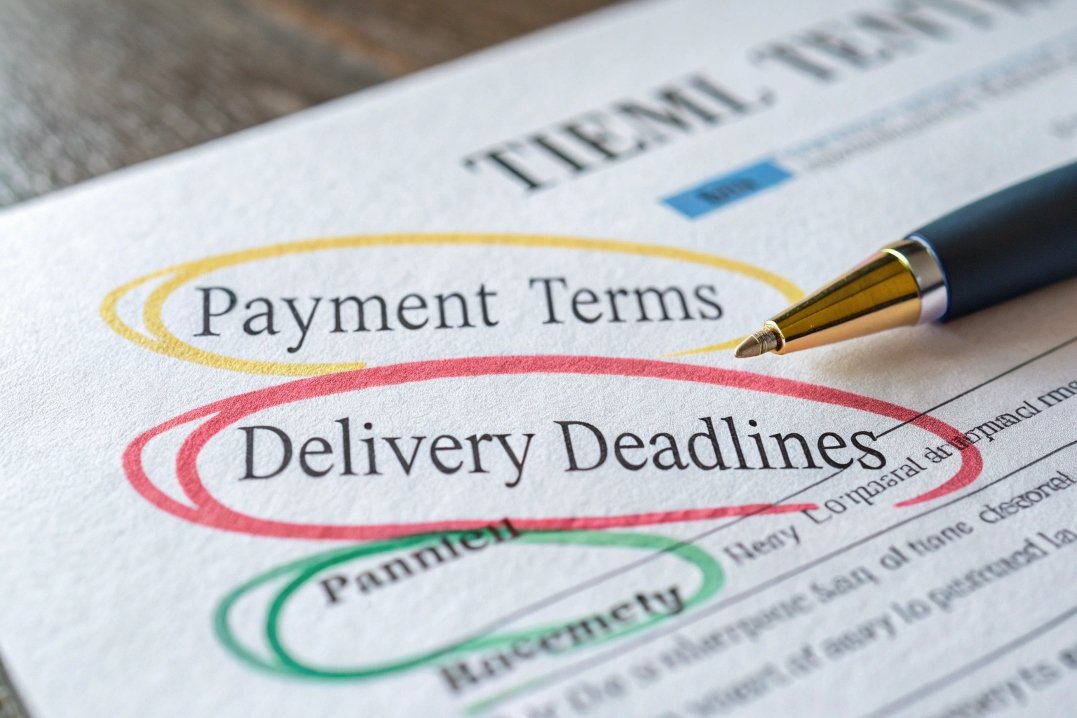
When I first started working with suppliers on custom parts orders1, I quickly learned that a clear, well-defined contract was the key to avoiding misunderstandings. Without a solid agreement, the risk of disputes, delays, and unexpected costs increases significantly. In my experience, a well-crafted contract sets clear expectations and ensures that both parties are on the same page from the beginning. But what exactly makes a contract essential, and what should it include to protect both parties involved?
Having a clear contract with your supplier is crucial for defining expectations, preventing misunderstandings, and ensuring smooth transactions. It serves as a reference point in case any issues arise during the order process.
In this article, we’ll discuss why having a clear contract2 is essential for custom parts orders, what should be included in the contract, and how you can avoid potential disputes by defining key terms upfront.
What Should Be Included in a Contract for Custom Parts Orders?

A custom parts order contract should cover all the critical aspects of the transaction, ensuring that both you and your supplier understand the terms of the agreement. A well-detailed contract reduces the risk of errors and prevents disagreements down the line.
Key Elements to Include in the Contract
| Contract Element | Why It’s Important |
|---|---|
| Product Specifications | Clearly defines the exact requirements for the custom parts, avoiding confusion about what is being ordered. |
| Pricing and Payment Terms | Establishes the cost, payment schedule, and methods, ensuring financial clarity and avoiding payment issues. |
| Delivery Schedule | Sets expectations for when the parts will be delivered, ensuring both parties are aligned on timelines. |
| Quality Control Standards | Specifies the quality benchmarks the parts must meet, reducing the chance of defects or subpar products. |
| Warranty and Return Policy | Defines the terms for any returns or claims in case of defective products, protecting both parties’ interests. |
Clear Expectations from the Start
By including detailed information in your contract, you create a solid framework for both you and your supplier to follow. This ensures that everyone knows what to expect and reduces the likelihood of misunderstandings or issues during the production and delivery process.
How Can You Avoid Disputes with Suppliers by Having a Clear Contract?

A clear contract acts as a safeguard against potential disputes between you and your supplier. By outlining the expectations, responsibilities, and terms of the agreement, you ensure that both parties understand their obligations.
Preventing Disputes Through Clear Contracts
| Contract Element | How It Helps Avoid Disputes |
|---|---|
| Detailed Product Descriptions | Helps prevent disagreements on product specifications by providing an exact description of the parts being ordered. |
| Defined Payment Terms | Clear payment schedules ensure there are no misunderstandings regarding when payments are due. |
| Delivery Terms and Deadlines | Having precise delivery dates and terms ensures that both parties agree on timelines, reducing delays and confusion. |
| Mutual Agreement on Terms | When both parties have agreed to the contract’s terms upfront, there’s less room for disagreements during the manufacturing process. |
| Dispute Resolution Clause | Specifies how disputes will be resolved (e.g., through mediation or arbitration), helping to handle conflicts efficiently. |
Reducing Risks
By creating a well-defined contract, you create a legal reference point in case things don’t go according to plan. For example, if the supplier delivers parts that don’t meet the agreed-upon specifications, you can refer to the contract to enforce the terms and resolve the issue quickly and fairly.
Why Is It Essential to Define Payment Terms and Delivery Schedules in the Contract?

Clearly defining payment terms and delivery schedules in your contract ensures that both parties are aligned financially and logistically. This not only avoids delays but also prevents potential disputes related to payments or missed deadlines.
Importance of Payment Terms and Delivery Schedules
| Key Element | Why It’s Essential |
|---|---|
| Payment Terms | Clear payment terms specify when and how payments should be made, preventing any confusion or delays related to financing. |
| Deposit Requirements | A clear deposit schedule helps manage cash flow and shows the supplier that you’re committed to the order. |
| Delivery Deadlines | Ensures that both you and your supplier are aware of when the parts should be delivered, preventing delays. |
| Shipping Terms | Defines who is responsible for shipping costs, risks, and logistics, ensuring no surprise costs or misunderstandings. |
| Penalties for Late Delivery | Outlines any penalties if delivery deadlines are not met, incentivizing suppliers to meet agreed timelines. |
Financial and Operational Clarity
Payment terms and delivery schedules are two of the most important aspects of any contract. When these elements are clear, you reduce the likelihood of confusion and keep the production process on track. For example, you don’t want to be caught off guard by unexpected costs or delays in the delivery of critical custom parts.
Conclusion
Having a clear contract with your supplier is crucial for ensuring smooth custom parts orders. By including detailed product specifications, pricing, payment terms, and delivery schedules, you can minimize the chances of disputes and ensure that both parties are aligned. Defining these terms upfront gives you a strong foundation for a successful partnership, allowing you to focus on your business without worrying about avoidable issues down the line.

